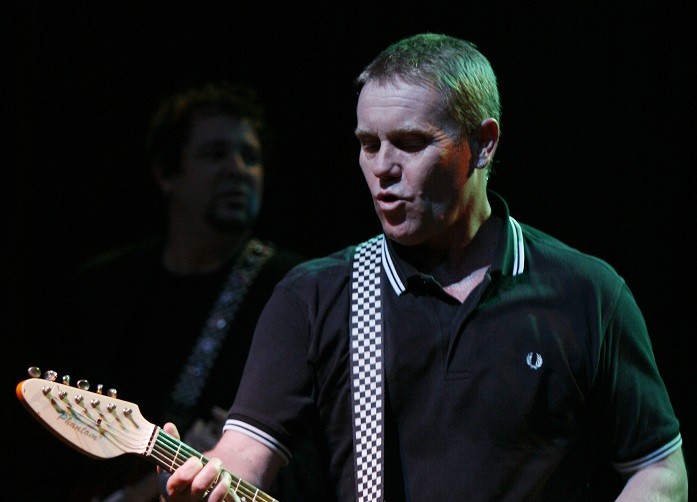When The English Beat hit the air waves nearly 40 years ago, the band known simply as The Beat in their native England became an almost overnight sensation for their unique style. Singer/songwriter Dave Wakeling has been the forefront artist on vocals and guitar for the band’s legendary songs like “I Confess,” “Save It For Later” “Mirror in the Bathroom” and “Tears of a Clown.”
The English band’s upbeat style transcends between soul, reggae, pop and punk with influences of ska that can be heard in their newest album, “Here We Go Love”, due out this summer. The band is currently on a nationwide tour promoting their latest album since “Special Beat Service” was released more than 30 years ago.
The English Beat will be appearing at City Winery in Boston next Thursday.
We caught up recently with Wakeling to talk about their newest album, how it differs from their past music and what he is most looking forward to when visiting Boston next week.
Your fans must be so excited to hear you have a new album coming out this summer. Tell us a little about Here We Go Love.
It has been a labor of love and a very exciting one. The songs sound exactly as they did my head before we recorded them. Some of the songs have woodwinds and there are strings in a couple. You always have great hopes for a record when it comes out, but this one came out better than I expected. It ended up being a great quality. We got to use some of the most fantastic recording equipment and it is really superb.
This is the first album to come out in more than 30 years. Why did you decide now was the time to come out with a new studio album?
We started putting new songs into the set about four years ago and people would ask us about a new song that was released. We had a lot of songs and some were half started, but we whittled them down to 20 and then 13, and ended up with all 13 on the album. It sounds really lovely. Everything just came together at exactly the right time.
How does this album differ from your past music?
There are similarities with all of The Beat albums, but they are all different in their own way. One may be fast and another is trans Atlantic pop. The new album has been interesting. We toyed with the idea of keeping it similar to the past, but decided to let the songs lead the way.
Who has inspired you musically along the road to your success?
Do you remember those Time-Life commercials where you would know all of the songs? (Laughs) There was a poignancy in pop music where people were caught between two worlds and Monty Python was the humor that explained all that. Motown was also very important to me.
How has your songwriting changed over the past 30 years?
I have been thinking about that. You have a clever attitude about death when you’re young, but when you write about it in your 60s, you do it slightly more delicately now (laughs). When you watch your children have children, it does make you change. You become more pragmatic and tolerant while at the same time, you’re still a curmudgeon. It’s as much fun or more fun now. I can juggle my own words now. Some of the songs have different overtones or inferences. I like those different layers, so it’s personal and near to you, yet universal in the ways that it resonates with others.
Is your song “I Confess” somewhat autobiographical?
They all are, but also hyper reality. You take something that happens in your life and exaggerate it to make a point. It was really all of us in those situations.
“Tenderness” really touched your fans. What do you think was the secret to this song’s success?
There was something hypnotic that happened to it. I think for America, it has that driving, search across the American frontier optimism of the sun is going to come up and it will be a new day. You are always searching for tenderness, but it has always been right there. It’s like love. That’s the thing I like about the songs. They might be written out of not knowing. but when applying the pressures of life, you start to see patterns. It’s interesting as a songwriter. There are varying degrees of commitment or conviction. I may try to be sarcastic, and might find myself defending the exact opposite of what the song was meant to be. Irony can often get lost in entertainment.
What are you looking forward to most when visiting Boston?
Boston was where “Tenderness” really broke. It’s the first city that really accepted us and that we were the most comfortable with. I understood the attitude of be nice or they will punch you in the face (laughs). Back in the day, WBCN would play all of our stuff, and Jim Sullivan was writing for The Boston Globe and you always wanted a great review from him. It’s a town that knows how to let the day at work be finished and to relax and enjoy yourself. You see that quite dramatically in Boston. In Galway, Dublin, Waterford and Cork, you really see that Celtic appreciation of enjoying the craic. You see the same thing in Boston.






















